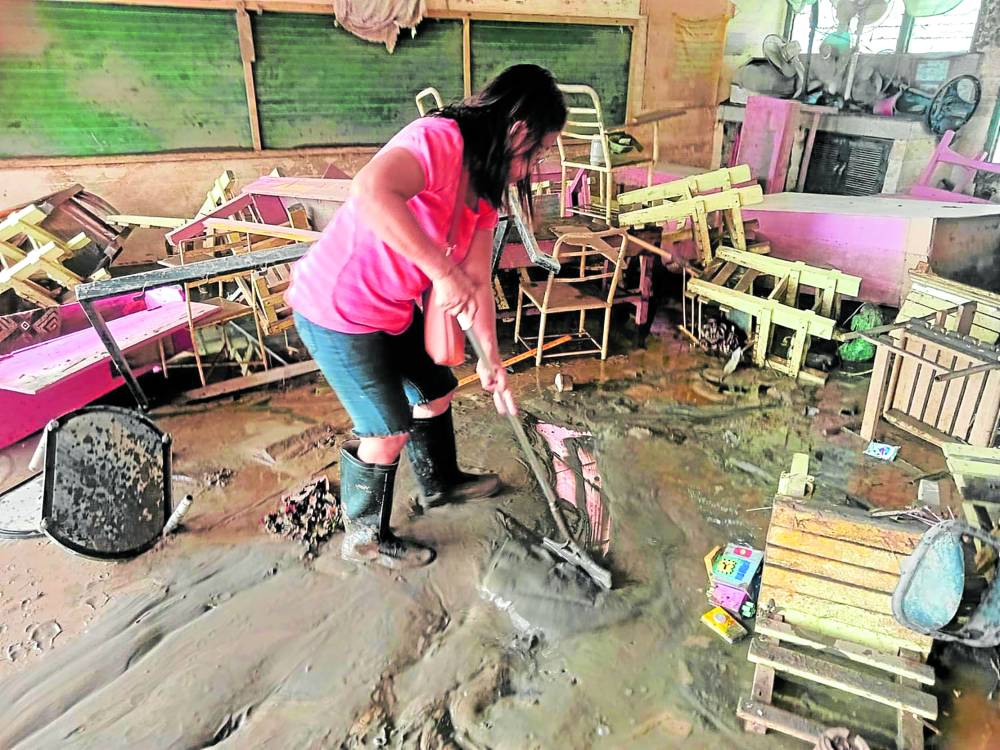
THICK MUD A teacher starts removing mud and debris inside a classroom in Nabua Central Pilot School in Nabua, Camarines Sur on Tuesday, a week after heavy rains spawned by Severe Tropical Storm Kristine (international name: Trami) inundated the school in floodwater that reached the roof of the school’s buildings. —Greg Beloro/Contributor
LEGAZPI CITY, ALBAY, Philippines — Still reeling from the impact of Severe Tropical Storm Kristine (international name: Trami), thousands of families in Bicol prepared for evacuation again on Tuesday as Typhoon Leon (Kong-rey) threatened parts of the region.
Dante Baclao, head of the Albay Public Safety and Emergency Management Office, said evacuations were ordered on Tuesday, particularly in areas prone to flooding and landslides, to prepare for potential rainfall from the approaching storm.
The new evacuation order came even while some 10,000 individuals affected by last week’s floods and landslides were still in shelters in Legazpi City, Libon, and other parts of Albay’s third district.
READ: Leon may become super typhoon
The Philippine Atmospheric, Geophysical and Astronomical Services Administration (Pagasa) issued Tropical Cyclone Wind Signal (TCWS) No. 1 over Camarines Norte, Camarines Sur, Catanduanes, Albay, and parts of northern Sorsogon as of its 5 p.m. bulletin Tuesday.
Gremil Alexis Naz, spokesperson for the Office of Civil Defense (OCD) in Bicol, reported that 68,921 flood-affected families, or 291,857 people, were still in evacuation centers in Camarines Sur.
As of Tuesday morning, flooding continued to affect 477 villages in the province, with the Bicol River still at “flood level” in Bula town and “overflow level” near Camaligan town.
Pagasa weather specialist Jaime Bordales Jr. noted that while Leon was expected to bring only light to moderate rains and was moving away from Bicol, precautions were still needed due to saturated soil conditions from previous storms.
Damaged schools
Public schools and colleges in Albay and Camarines Sur had declared an “academic break” as many classrooms sustained severe flood damage.
Camarines Sur Polytechnic Colleges in Nabua town extended the break until Nov. 10 to allow time for repairs after floodwaters reached the roofs of school buildings during Severe Tropical Storm Kristine.
In Naga City, the University of Nueva Caceres suspended classes at all levels until Nov. 4, allowing time for essential repairs.
Naga City Mayor Nelson Legacion also ordered a citywide suspension of classes this week to prioritize relief and rehabilitation efforts.
Gilbert Sadsad, director of the Department of Education (DepEd) in Bicol, reported that 816 classrooms were destroyed and 4,352 more were damaged in 520 schools.
Some schools in Camarines Sur’s Rinconada district and areas like Canaman, Camaligan, Milaor, and San Fernando were still flooded as of Tuesday, a week since Kristine dumped heavy rain over the region.
Over 400 schools were still being used as evacuation centers in Camarines Sur and parts of Albay.
According to DepEd Bicol, temporary learning spaces using light materials would be installed when classes resume in November, or provide students with learning activity sheets for some schools that could not open.
DepEd Bicol estimates over P52 million would be required for cleaning materials, new learning tools, and teaching supplies for affected schools, some of which began clearing operations on Monday as floodwaters receded.
In Nabua town, Sta. Lucia Elementary School teachers like Greg Beloro have been removing mud and debris left behind by the floods, with many school facilities, including computers, damaged.
Storm surge
“We’re doing what we can, but most families here are focused on cleaning their own homes. We’ve planned a cleanup drive with village officials on Wednesday,” Beloro said in a phone interview.
Pagasa warned Leon could trigger a storm surge from 2.1 meters to 3 meters, which could hit low-lying coastal areas of Batanes and Cagayan, particularly the town of Calayan in Cagayan and the towns of Basoo, Itbayat, Ivana, Mahatao, Sabtang and Uyugan in Batanes.
In its 5 p.m. bulletin on Tuesday, Pagasa said Leon underwent “rapid intensification” over the waters of Cagayan province, with the center of the eye estimated to be 505 kilometers east of Tuguegarao City, moving west-northwestward at 10 km per hour, and packing maximum sustained winds of 150 km/h near the center and gustiness of up to 185 km/h.
TCWS No. 2 was raised in Batanes, Babuyan Islands, mainland Cagayan, the northern and eastern portions of Isabela, Apayao, the northern portion of Kalinga, the northern portion of Abra, and Ilocos Norte.
TCWS No. 1 was hoisted over the rest of Isabela, Quirino, Nueva Vizcaya, the rest of Kalinga, Mountain Province, Ifugao, Benguet, the rest of Abra, Ilocos Sur, La Union, the eastern portion of Nueva Ecija, Aurora, the northern and eastern portion of Quezon, including Polillo Islands, Camarines Norte, Camarines Sur, Catanduanes, Albay and the northern portion of Sorsogon.
Elsewhere in Cagayan Valley, OCD regional director Leon Rafael, at an online news briefing Tuesday, urged residents in coastal and mountainous areas to stay alert due to heavily saturated soil conditions caused by rains spawned by Kristine.
Rafael advised disaster risk-reduction officers to keep evacuees in shelters for their safety.
Farm losses
While Kristine’s damage was still being assessed, Cagayan province said its losses already reached P629.63 million.
Data from the Cagayan Provincial Disaster Risk Reduction and Management Office on Monday showed extensive agricultural losses: P608.99 million in rice plant damage; P12.87 million in corn; P9.6 million in high-value crops; P167,350 in fisheries; and P730,000 in livestock losses in Solana, Lal-lo and Amulung towns. Infrastructure damage was estimated at P103.6 million. —with a report from Villamor Visaya Jr.